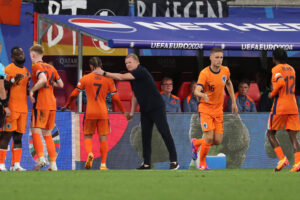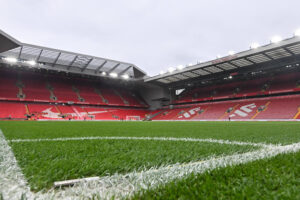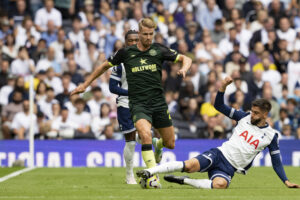In an era when short-range passing out from the back has now become the norm, Sean Dyche and Burnley have often come in for criticism for their more straightforward style of play. There were times when Dyche refused to accept that his side’s method solely revolved around getting the ball from one end of the field to the other as quickly as possible through frequent long-balls, yet he is now accepting and embracing it.
Burnley Finding Consistency With Unique Style of Play
Burnley have established themselves as a stable and perhaps overachieving Premier League side. They have comfortably avoided relegation every season since their return to the Premier League in 2016/17 and even pushed on for European honours in 2017-18. This season, without many noticing, they have move up to tenth with 37 points and were in the top eight before Arsenal and Wolves’ wins on Sunday.
Yet what is most fascinating about Burnley, more than the consistency with a relatively low net spend on players, is how they achieve it. While many other managers have felt the need to build their sides’ attacks slowly and fluidly from their own goal, Dyche has instead opted for a more simple approach that revolves around long-balls which aims to reduce the risk of being caught out deep in their own half.
This season, Burnley average 72 long balls per game in the Premier League – only Sheffield United (76) are averaging more. In addition, their goalkeeper, Nick Pope, has hit 450 unsuccessful long passes – second only Ben Foster of Watford (488). However, Pope has hit 62.4% of his passes long, more than Foster’s 61.5% and more any other goalkeeper in the Premier League.
To further emphasise the contrast in style between Burnley and other teams in the Premier League, the Clarets rank last when it comes to total number of short passes this season (258). Furthermore, only Newcastle United (8662) have made fewer passes in the top flight this season than Burnley’s 8743.
“If you can get it from here to the hole in less shots than everyone else, that’s what it’s all about,” Dyche explained in August 2018. “The idea of football is to try to win. You work backwards from winning. But win you must. You have to do what you do to win. All managers would love to play 600-pass football and win all the time. There are no rights and wrongs to football.”
Dyche knows only too well that to play a more attractive brand of football would prove difficult with the quality of players at his disposal. “If I went to a different club with different skill sets, trust me, I’d play a different way,” he continued. He also knows that such a method could also bring unnecessary problems, especially in his side’s own half.
By opting with his current style of going long more frequently, Dyche is removing risk from the equation and therefore reducing pressure on his defence and goalkeeper. Burnley average the second-lowest average percent possession in the Premier League this season (42.8%) but have only been dispossessed only 206 times – the second-fewest of any team, behind Newcastle (205). Opposition teams are having to win the ball further away from Burnley’s final third because Dyche’s side do not attempt to keep the ball there.
In the past four seasons in the Premier League, Burnley have only conceded 17 errors leading to goals. Arsenal, by contrast, have made 37, Liverpool and Manchester United 20 and Fulham, who attempted a smooth passing game out from the back upon their return to the top flight, made 12 last season alone. It led to their immediate relegation back to the Championship.
Burnley’s approach also has benefits in an attacking sense. While opposing sides use the high press as a way of dispossessing sides, Burnley not only negate the threat towards their own goal but their method can exploit space in behind high defensive lines by getting the ball up the field as quickly as possible.
“Can we play in between, shift and slide the ball quickly across the pitch to get into aggressive attacking positions? Yes we could,” continued Dyche. “On another day, against a high back line, why would you not put it in behind them? If the opposition are really good at keeping the ball and being progressive with their passing, are you going to beat them at their game? Probably not. Can you beat them in a game they’re not used to? There’s a chance.”
Dyche is now finding attackers who fit the style he wants his team to play. Striker Chris Wood sits sixth in the league this season when it comes to total aerial duels (234), while Ashley Barnes (152) and Jay Rodriguez (142) also rank in the top 20. Their presence has helped Burnley win 678 of their 1347 aerial battles – second only to newly-promoted Sheffield United (681).
Burnley aim to use the presence of the likes of Wood and Barnes to their advantage, especially from out wide. Only Liverpool, Everton and Leicester have scored more goals from headers than the Clarets (8) in the Premier League this season, while they also rank in the top ten for number of crosses (527). Dwight McNeil has been particularly instrumental on the wing, racking up 177 crosses – the fourth most of any midfielder – and creating 11 big chances – the second-most of any wide midfielder.
In terms of outside views of Burnley’s method, criticism is often not far away. In April 2019, then-Chelsea defender David Luiz accused Dyche’s side of playing “anti-football” after their 2-2 draw at Stamford Bridge. “They were playing 11 inside the box. It’s difficult to score against a team like that,” said the Brazilian. “It’s difficult when you play against a team who have two chances and score two goals and didn’t want to play the game.”
Istanbul Basaksehir boss Abdullah Avci was another to take aim at Burnley’s style before the second-leg of their Europa League tie in 2018, describing the first match as a ‘British brawl’ due to their opponents’ long-ball tactics and 28% possession. Still, Dyche stuck to his beliefs. “I’ve got no problem with that,” he responded. “My personal view is to play effective football in any game. If that means making sure the ball goes on top of their centre-halves then that’s what we’ll do.”
Regardless of their impressive results, criticism of Burnley’s style is inevitable. Yet others will look past the aesthetics and focus on the effect. Not only are Dyche’s side finding consistent results and establishing themselves as a stable top-flight side, but they are also doing it in a way that is often scoffed at by other managers. Love them or loathe them, Burnley are unique and therefore one of the more remarkable teams in the Premier League.
Main Photo:






